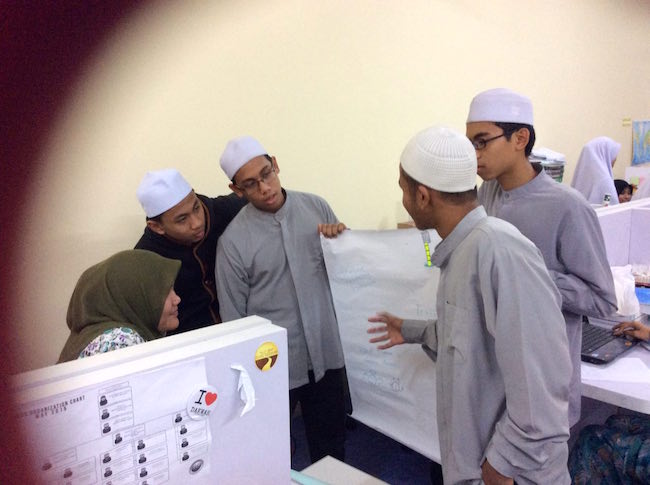Assalamualaikum wa Rahmatullah wa Barakatuh.

Alhamdulillah. Solatan wa salaman ‘ala Rasulillah. Amma Ba’du.
Sheikh Ramzy Ajem laid down many fundamental aspects on how Islam emphasises on connecting knowledge with action. Learning demonstrated by Rasulullah PBUH was always with the motivation of acting upon it. That is one of the thing we can relate when Rasulullah PBUH used a lot of modelling on how the understanding should be applied.
“Pray, the way you saw me praying”
“Take from me your Manasik (Hajj)”
In our school, like what Sheikh Ramzy Ajem mentioned, the teachers’ integrity is always the pre-requisite to be fulfilled and maintained. One should walk the talk. And they must be made visible to the students. The main challenge is to create teaching that inspires action. Students might see the best example before their eyes, but that does not necessarily motivate them to do the same. The strategy on this matter covers both curriculum design and type of instruction we use.
CURRICULUM DESIGN
All subjects, both Diniyyah and ‘academic’ must embed the proper taxonomy of thinking from knowing, understanding, up to applying and creating and designing. When learning about Fiqh al-‘Ibadat for example, students design leaflet on guiding patients in hospital to perform Salat. Subjects must also be made contextual, for students to realise where do these knowledge exist in real life. When they learn probability theory in Mathematics, teachers guide students to identify how the theory functions in industry and workplace. We allocate certain budget to encourage teachers do field trip for contextual learning outside schools, and to promote integration by doing them across three or more subjects.
INSTRUCTION
The founder of our school formularised what is later to be known as Khalifah Method, saying, “if you give any individual or social group two things, that individual or group will inevitably move toward everything good and right:
- a positive, accurate and motivational worldview (embedding the idea of being a khalifah as a Quranic concept on identity)
- a good understanding of the LAWS OF LEARNING by which all human characteristics develop.
In the law of learning, we identify three factors that influence the formation of personality; physical , social and inner speech. We use the inner speech to fight negative influence. To nurture the willingness to practise good behaviour, we REWARD to increase the probability for good action to be repeated. Any direct or indirect PUNISHMENT should be avoided because punishment causes the REVERSE effect. Any failure of misbehaviour will be tackled firmly with reasoning on consequences as a shaping process, until we reach a point of agreement on improvement and betterment. Trust must be restored and the students will be encouraged with kindness, free from harshness
SCHOOL FUTURE PROJECT
We are working on building our permanent school campus which hopefully will include a miniature city with many types of ‘office’ as a simulator where students work in a profession and function as consumers and citizens as part of society. This will bring the students first hand experience on what ‘working’ is. Insha-Allah.
SPECIFIC CONCERN
During the time of the Prophet PBUH, there were no subjects like we know today such as Fiqh al-Ibadat, Aqidah, Tazkiyyah al-Nafs (Tasawwuf). Everything were together, the unified content. For many important reasons, scholars inductively identified the structured knowledge embedded in the al-Quran and the Sunnah and compiled them into subjects and specialities like what we have now when we describe “Islamic Studies”. My concern is, the Prophet PBUH used different vocabularies to introduce Solat for example, to the companions, compared to us today. We use Fiqh terminology which is dry, very technical and lack of motivation. This might be the reason why our students show different outcome. The sahabat loved to practise what they learnt from their teacher, the Prophet PBUH, while our students might score good grade on Islamic Studies but do not have the same motivation to practise Islam. This become a very strong reason why integration is crucial in current Islamic education.
How relevant is this concern?
Knowledge without action is like a tree without the fruit.
HASRIZAL
kmss.edu.my
Muslims, anyone who examines The holy Quran and Sunnah finds the most useful and wonderful lessons in raising children. Raising them integrated coherent usefulness to themselves, their communities and for all mankind. When you bring up a child teaching him faith in Allah and religion, sincerity elevates him from the Earth perigee, and transcends him to the upper horizons. http://www.dawateislami.net/radio/quran-internet-radio